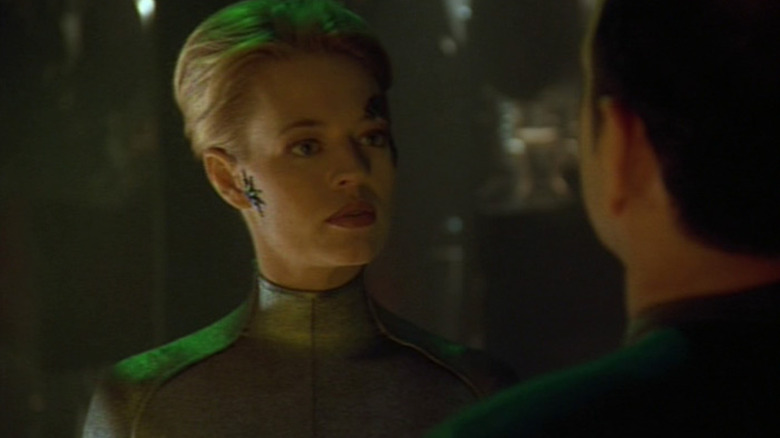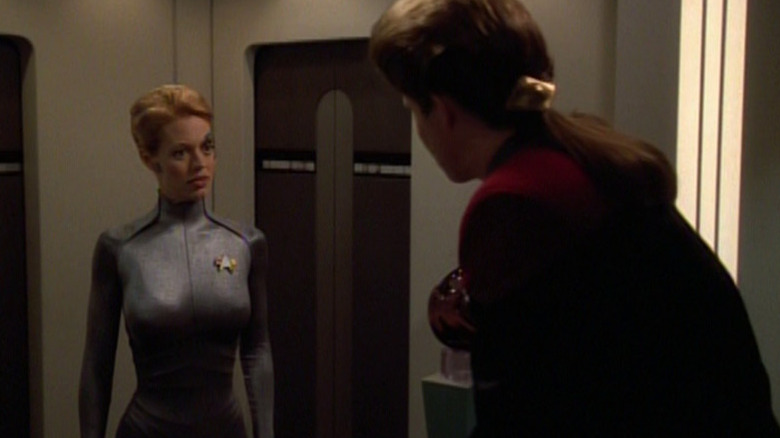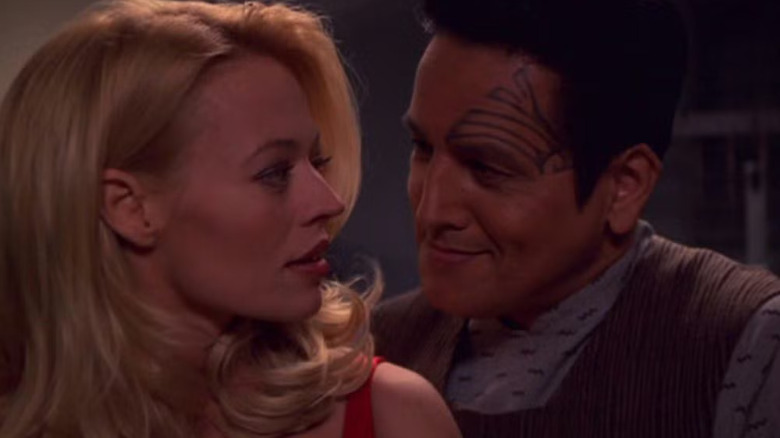Jeri Ryan Thinks Star Trek: Voyager Made Just Three Big Mistakes With Seven Of Nine
"Star Trek: Voyager" infamously struggled with ratings for its first three seasons. It was doing okay, but it was nowhere nearly as popular as its immediate antecedents "Star Trek: The Next Generation" and "Star Trek: Deep Space Nine." The show's producers tried out several desperate measures to boost ratings, but they rarely worked. For instance, the regular use of a sun-drenched bikini beach holodeck program didn't set Trekkies' hearts aflame. Eventually, the showrunners figured the series needed a character shake-up to attract attention. They wrote off the gentle, kind, moral character of Kes (Jennifer Lien), and replaced her with a comely Borg names Seven of Nine (Jeri Ryan). Ryan was possessed of magazine model looks, and the costumers outfitted her with an elaborate corset and skin-tight catsuit, clearly a desperate ploy to add sex appeal to the series.
Strangely, though, the ploy worked. Seven of Nine proved to be very popular, and ratings went up. What's more, the show's many writers loved the idea of having a super-genius, semi-mechanical former Borg on the series, and they couldn't stop writing stories for her. Seven quickly became the central star of "Voyager," supplanting most of her co-workers in screentime. Yes, some of the other cast members resented the popularity of Ryan and of her character.
Ryan loved playing the role, even if she hated that damned corset. Seven of Nine stayed through the end of "Voyager's" seven seasons, expanding and growing all the while. She slowly became more human, and even fell in love. Seven returned to "Star Trek" in 2022 as part of "Star Trek: Picard." By the end of that series, she had become the captain of the U.S.S. Enterprise-G.
Jeri Ryan recently attended MegaCon in Orlando, Florida to talk about her career, and revealed some issues she had with the "Star Trek" writers' treatment of Seven. Indeed, she took note of three palpable mistakes with the character, two of them large, one of them small. The small one: how do you pronounce "futile?"
Jeri Ryan didn't like the pronunciation of 'futile'
Ryan talked about how she didn't really know anything about "Star Trek" or the Borg when she signed on to play the part, and shared the amusing story of her assigned "homework." She was asked to watch the feature film "Star Trek: First Contact," and the "Next Generation" episode "The Best of Both Worlds," and was then expressly instructed not to imitate anything she had seen. More than anything, she noted that the Borg, when they attacked and assimilated their prey, would announce that "Resistance is futile." In every instance, the borg pronounced the world "futile" and "few-tile," and not the equally common "few-tle." This made for a weird moment of head-butting on the set of "Star Trek: Voyager." As Ryan recalls:
"In my 103 episodes, there are ... three missteps with that character. And that's really it! [...] 'Resistance is futile!' is the first one, and that's kind of a biggie. [...] And by first script came up, and it said 'Resistance is futile.' So I said 'Now, I should say 'few-tile,' right? 'Cause the voice of the Collective says 'few-tile.' They said 'No, no, no. Patrick [Stewart] just has a British accent, you say 'few-tle.' And it's like ... 'You suuuure? The voice of the Collective says 'few-tile.' Every. Single. Time.'"
Secondly, Ryan didn't like that Seven became, in her words, "too human too quickly." Seven was born a human, but was assimilated into the Borg Collective as a young child. Her memories were mostly erased, and she wholly became a soulless machine. When removed from the Collective and placed on the U.S.S. Voyager, Ryan liked the idea of Seven coming to her humanity very, very gradually. But early on, Seven was freer and more expressive than in the rest of the series. Ryan pointed out, though, that the writers corrected that error, by scaling back Seven's early human developments and making her more machine-like later in the series.
Jeri Ryan also hated the Seven/Chakotay love story
Many "Voyager" fans will tell you about the awful, late-series development of Seven falling in love with Chakotay (Robert Beltran), the Voyager's first officer. Many objected to the plot point because it was so abrupt. It was also far more logical for Seven to instigate an affair with the Doctor, a living hologram that she spent far more time with. Instead, Seven was forced into Chakotay's arms in a way that felt illogical and mismatched. Even Beltran hated it.
Ryan thought the relationship with Chakotay was a fine enough idea, but that the showrunners deliberately didn't develop it well. She even recalls the episodes in which the love story arc began, and how the producers told her not to play up the nascent romance. In her words:
"The third one was ... Do you remember the episode where Seven was fantasizing on the holodeck, practicing dating, and she fell in love with Chakotay? The holodeck Chakotay? [Prolonged, exasperated pause] The very next one we shot was Seven and Chakotay, like, crash-landed on the shuttlecraft or something on a planet. And they were stranded together. I specifically asked the producers, and Robert did as well, that we should carry this on, right? His character wasn't aware, because it was a holodeck simulation, but I should be carrying this [...] storyline."
But the producers told her no, don't play up Seven's attraction to Chakotay. She didn't, and it seemed the romance died. But then she continued:
"Cut to the final episode and it's 'Oh! Seven and Chakotay are dating! Oh! They get married!' Which is fun. It would have been perfectly fine and made perfect sense had that been played! That should have been an undercurrent for my character [...] the whole time!"
Perhaps fans would have liked the Seven/Chakotay romance better if it had been actually developed.


